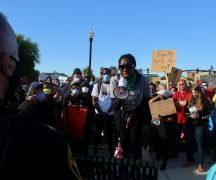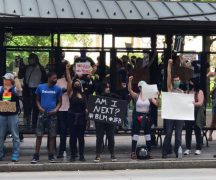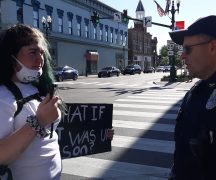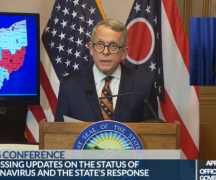By DAVID DUPONT
BG Independent News
Last Sunday Jocelynn Prater and Elizabeth Steffen were in the graduation parade for Bowling Green High School.
This Sunday (June 7) the two young women were leading a parade of another sort, a line of marchers from just west of the fairgrounds to Wooster Green, to make their voices heard as part of the global protests against police violence against African Americans.
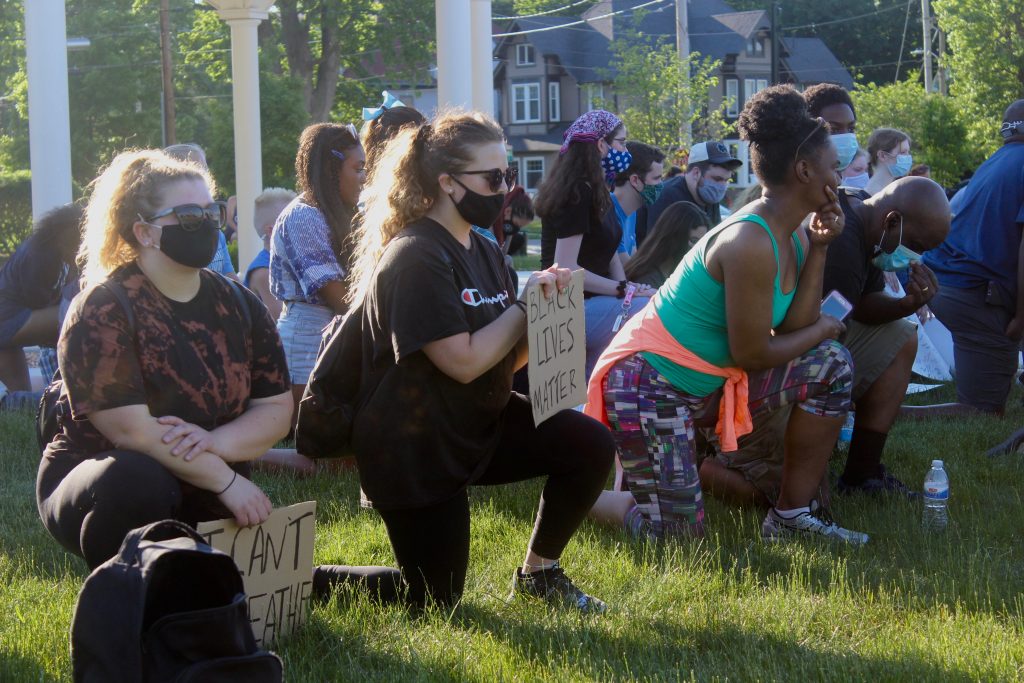
At Wooster Green they and about 250 others knelt and bowed their heads for seven minutes while facing the Bowling Green police station. It was meant to commemorate the time a Minneapolis police office knelt on the neck of George Floyd, killing the African American man, the latest death of black person by a police officer.
The gruesome video ignited protests across the country. In Bowling Green last week more than 500 people marched from the courthouse to Wooster Green.
Like that protest, this Sunday’s march was peaceful, though its emotional tenor was less raw, less freighted with rage over not just Floyd’s killing, but the 400 years of accumulated oppression of black people.
This oppression has been much on the minds of both Prater, who is black, and Steffen, who is white.
They’ve had conversations about it, especially since NFL quarterback Colin Kaepernick took a knee during the National Anthem.
That, Steffen said, “was a catalyst” for their discussions. The protest sparked outrage against Kaepernick and the other players. They were accused of being unpatriotic and disrespecting the flag and the military. President Trump called them “sons of bitches.”
“We didn’t see what the issue was,” Steffen said with
Prater continuing “because he was peacefully protesting.”
Prater said: “People were taking it out of context, that it was disregarding the American flag, when in fact he was doing it for police brutality, which is still going on four years later.”

They said they would have participated in last Sunday’s protest except for graduation. They had already been planning their own march.
As the protest roiled across the nation, they felt they had to do something. They organized and promoted Sunday’s march over social media. And on Sunday more than 200 people gathered under sunny skies with temperatures in the 80s at the parking lot on the northwest corner of the West Poe and Haskins intersection.
Prater’s mother, Lutricia Prater, moved around as the marchers assembled to register voters.
“Let’s make this a party with a purpose and register as many people as we can,” she said.
From there they walked down on the sidewalks on West Poe to North Main and from there to Wooster Green. Bowling Green police officers assisted the marchers in crossing major intersections.
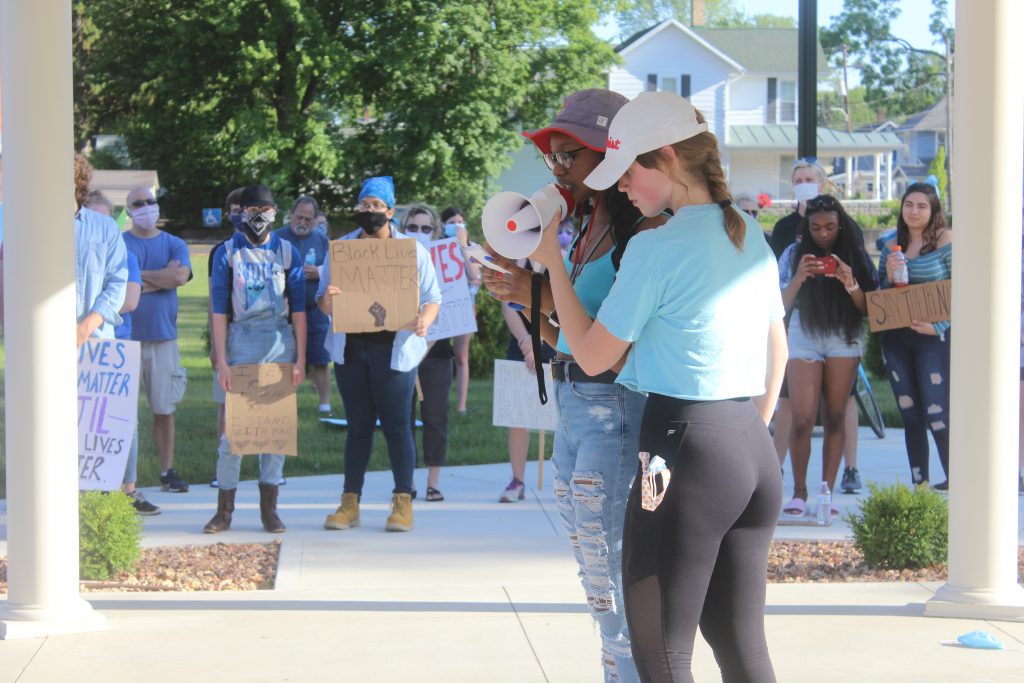
At Wooster Green, Prater spoke to meaning of the march.
She was a young black woman in a time of revolution, she said.
It is a time, when her father is afraid to let her drive to Columbus because he doesn’t know what will happen if she’s pulled over. Prater said she lived in fear of her father and brother “being pulled over and not making it home to their family.”
It was a time when she and other African Americans felt threatened by those who are supposed to protect them.
A time when black parents must have “the talk” about dealing with police.
“Parents dread it because it means their children have gone from being innocent to a threat in the eyes of an absurdly racist society.”
Prater said she dreads the time when she must have that same conversation with her future children.
“No sudden movements. Don’t question why you are being pulled over. Comply now complain later. Never raise your voice. Don’t talk back. Do as you’re told.”
These are not worries white parents have.
Black parents have to give these instructions “while still letting them know their worth and value in society,” Prater said.
Police brutality is real, she said. It cannot be “sugarcoated for us.”
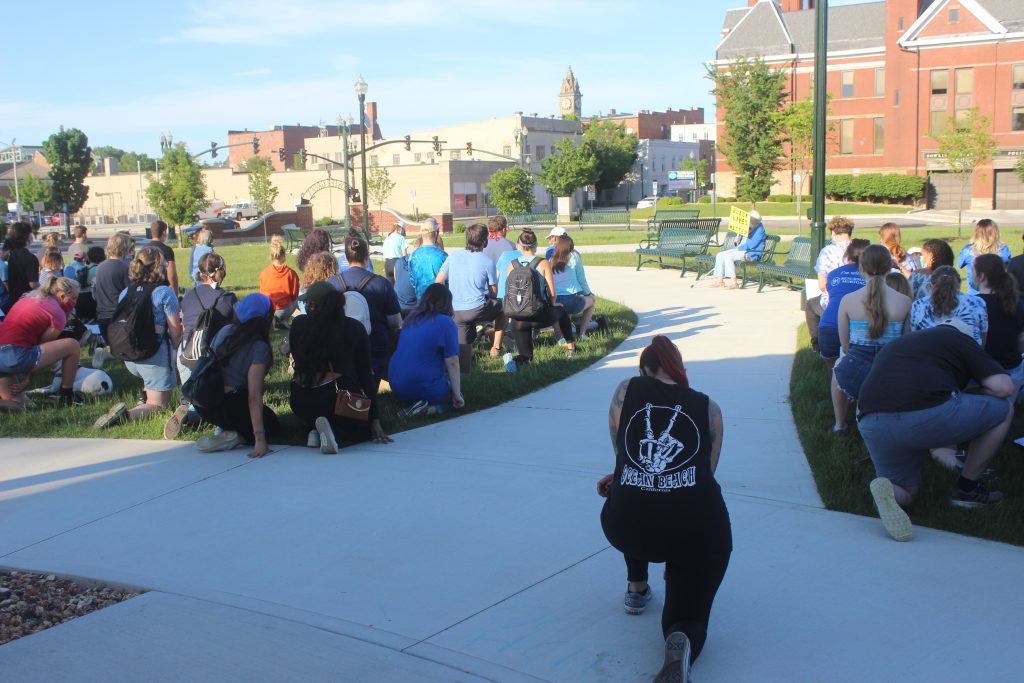
The protests will continue because those who shot and killed Breonna Taylor in Louisville have not been charged and the officers who killed Tamir Rice in Cleveland are free.
Their names, and Floyd’s name and the names of other victims of police violence need to be repeated, she said. “Teach them that black lives matter so one day all lives will matter.”
A change is needed and “that change rests with us, the rising generation,” she said. “We must never stop working for a better world. We must never settle. We must always fight any injustice. It will not happen overnight, but it must start now with us.”
That change, both Prater and Steffen said, is not so much about concrete actions as much as a change in attitudes.
“That people have a better mindset, and they’re more aware if they’re being racist,” Prater said. “More socially conscious,” Steffen added.
They are hopeful that these protests will bring about lasting change. The impact of other protests over previous killings faded. “This has not gone away,” Prater said.
Steffen added: “Hopefully, this is the biggest change that we can see in America.”



